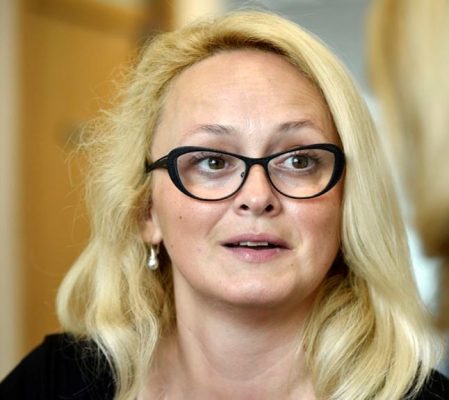Interview with Lejla Ramić-Mesihović: Efficient and professional public administration one of the pillars of successful pre-accession process
“Comprehensive and results-oriented regional cooperation has been recognized by both regional and international community as one of the strongholds of the reform processes. Exchange of experience, positive practices and lessons learned is surely beneficial for each country of the region and we can all learn from each other.”
Can you tell our readers about the current state of affairs regarding EU integration of Bosnia and Herzegovina? How much is civil society, and your organization in particular, involved in the process and its coordination structures?
Bosnia and Herzegovina holds the status of a potential candidate for EU membership and it filed a formal application for EU membership in early 2016. On 9 December 2016 received the European Commission’s Questionnaire. At the same time, the country has been trying to conduct reforms included in the Reform Agenda, adapt and implement the Stabilisation and Association Process and improve its internal coordination and communication. Due to political complexities and insufficient political focus on European integration process, some answers to the EU Questionnaire still remain un
answered mid-December, but there are indications that efforts have been intensified on completion of disputable part of the answers. Civil society organisations interested in the European integration process operate on three levels: activist, watch dogand think tank. FPI BH is a think tank. Our mission is to serve the society in Bosnia and Herzegovina (BiH) and its institutions through a wide range of research opportunities, publications and organization of events, which promote awareness of BiH internal governance issues, as well as its foreign policy directions.
How does „civil society scene“ look like in BiH? In your opinion, what are the challenges faced by civil society in your country, and on the other hand, what are the opportunities that should not be missed?

Lejla Ramić-Mesihović, Foreign Policy Initiative Director
Civil society organisations often lack capacity to see the entire picture and coordinate among themselves. Some developments have existed for the past couple of months in institutionalisation of cooperation between the CSOs and the BiH Council of Ministers on issues of general nature. In addition to this, two organisations initiated establishment of the Alliance for offering NGOs’ i.e. alternative answers to the EU Questionnarie. There is also the Initiative for Monitoring of EUI, which is primarily focused on a part of political criteria from acquis chapters related to the Rule of Law. In principle, we support work of both networks. BiH does not have a structure such an EUI convent, which could support European integration processes as a good and competent base, which would be complementary with efforts of governing structures in terms of competence and could bring into the matrix an appropriate civil society monitoring and participation in the process as it evolves. The Alliance does have the ambition to grow into this structure, but this ambition still remains to be seen in practice.
As a member of the Think for Europe Network (TEN), your organization is one of the key partners on the WeBER project. How would you describe the project, its mission, its role and its benefits for public administration reform in Western Balkan countries, and B&H in particular? Do you think that the WeBER model of regional cooperation could be replicated to other spheres of joint interest between countries of the region?
We are approaching the end of the second year of the implementation of WeBER project and we are very proud of the activities and results achieved so far. WeBER has been recognized as one of the best examples of how regional cooperation and comparative approach to the work of civil society organizations in the Western Balkans can yield results. In BiH, we have managed to gather more than twenty CSOs as members of the PAR National Working Groups, we have achieved excellent cooperation with BiH PARCO and our WeBER Platform members with whom we are in constant contact regarding PAR activities in BiH. Efficient and professional public administration is one of the pillars of successful pre-accession process and we are trying to provide continued and expert support to our institutions and CSOs. Furthermore, we are particularly proud on the work being done by the six local level organizations which have received small grants in BiH. Their projects are ongoing, but they have already managed to achieve some concrete results, which exemplifies the need for more focus being paid on the improvement of the local level administration.
Comprehensive and results-oriented regional cooperation has been recognized by both regional and international community as one of the strongholds of the reform processes. Exchange of experience, positive practices and lessons learned is surely beneficial for each country of the region and we can all learn from each other.
Can you tell us more about ongoing projects and initiatives that your organisation is currently implementing both in BiH and/or at the regional level?
FPI BH is a pioneering organisation in shadow reporting on European Integration in BiH and in the region and it has strong passion for both European integration and foreign politics in the wider sense of this term. We focus on expanding society’s knowledge about the changing nature and conduct of international relations, foreign affairs, diplomacy and repercussions on BiH institutions. Our experts analyse the foreign policy and try to advocate among relevant stakeholders and decision makers in the legislative and executive branches in BiH and in the international community. Ever since we started our enageged analytical activism in 2004, i.e. two years prior to formal registration of our non-governmental organisation, we tried to do our best to contribute to the strengthening of processes related to mentoring and training of emerging young professionals in BiH. Also, we are trying to contribute to improvement of public understanding about the nature of the governance reform process in BiH, it’s foreign policy and EU integration process. In addition to this, we have been working hard with a number of decision-makers on affirmation of principles related to gender equality in decision-making processes. On regional level we are proud to be in company of very good and foreward thinking think tanks through the Think for Europe network. FPI BH is also a proud supported of activities done under the Western Balkans 6 advocacy group.
Civil society needs to become acknowledged as a partner to governments in our region and its contribution to policy creation and monitoring recognized. What message would you send to CSOs in our region on how to strengthen their position Vis-à-vis their governments and policy making structures?
Civil society organisations have to advance their specific competences needed for participation and contribution into the process and improve articulation of their profiles which are today primarily driven by priorities of the donor communities in the region. We are to be comprehended as partners to governments in actions which are to lead to better, European future and stability in the region. We are not enemies. Though sometimes, a lot of space for improvement exists for advancement of mutual understanding and ways of cooperating. I do believe that in this sense, the best is yet to come.
*This interview is produced as a part of the third issue of the TEN Newsletter.

